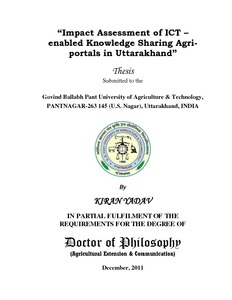Impact Assessment of ICT – enabled Knowledge Sharing Agri-portals in Uttarakhand
Abstract
It has been argued that Information and Communication Technologies (ICT) can lead to development in developing countries. With this in mind, developing countries have been rushing to implement ambitious ICT projects in rural areas through the direct-indirect supervision of institutions such as, the World Bank, United Nations (UN) and other donor/local agencies. The main focus of the interventions has been the implementation of these ICT projects, rather than understanding their impacts at the recipient level. This lack of understanding has led to many failures of ICT projects reported in the literature. There is a need to understand impacts of ICT projects in their local context considering the participants‘ perspectives at the micro level. The analytical research design was used to conduct the investigation. Two Agri portals viz. Agropedia and aAQUA were selected by census method. In an all 83 progressive farmers and 55 SAU and KVK scientists and portal managers from IIT, Kanpur and IIT, Bombay were selected as respondents. Interview Schedule, Impact assessment index and opinionnaire were developed to collect data from the farmers. Findings of the study revealed that majority of farmers were middle aged, educated up to Intermediate, with main occupation as farming, general caste, medium family income, with majority of male, had nuclear family and medium family size, KVK as major point of access to internet and information, possess medium level of communication media, high level of agricultural equipment, medium household possession, medium level of social participation, and contact fellow farmers for agricultural information. Television is the most popularly accessed media, majority had low farming experience, medium animal possession, grow 2-3 crops a year, all of them were aware of the Agri-portals‘ existence through KVK scientists, majority of them visited the selected Agri-portals for market information on monthly basis, shared the information provided through both the Agri-portals with neighbors, satisfied with Agri-portals‘ recommendations, gained medium knowledge and utilized to medium extent. Maximum number of farmers opined that uploaded content of Agropedia somewhat and aAQUA content was moderately relevant, with high technical words, moderately useful content, with appropriate readability and had the opinion that internet is the best way to learn new things. Maximum farmers reported somewhat positive changes in income, quality of produce, crop diversification due to Agropedia and aAQUA. Less number of trainings was the most important constraint identified by the farmers. Education, communication media possession and agricultural equipment possession have positive and highly significant relationship with overall knowledge level. Dependent variable, intend to practice the recommendations of aAQUA in future is positively and highly significant with annual income, caste and farming experience. Majority of the scientists and portal managers reported that content on both the Agri-portals were highly relevant, with well organized and attractive home page

